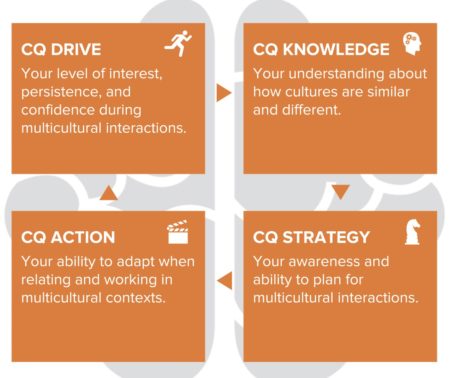In today’s global workplaces, fostering diversity isn’t just a goal; it’s a necessity. Organizations are increasingly investing in Diversity, Equity, and Inclusion (DEI) programs. Those efforts are aimed at building systems that allow individuals of various backgrounds and identities to have equal access to opportunities and be treated fairly. But while the programs establish crucial structural changes, they don’t fully address the human side of inclusion. This is where Cultural Intelligence (CQ) becomes indispensable.
DEI focuses on creating an inclusive framework. It covers hiring practices, equitable policies, and the promotion of diverse perspectives. These initiatives can lead to diverse teams and inclusive environments on paper. They don’t always equip individuals with the skills needed to work effectively across differences or create a psychologically safe environment. CQ can bridge this gap.
What is Cultural Intelligence?
Cultural Intelligence is the ability to understand and relate to people from different cultural backgrounds. Four key components make up CQ:
- Drive (a desire to engage with other cultures)
- Knowledge (understanding cultural norms)
- Strategy (the ability to plan for and adapt in cultural interactions)
- Action (the capacity to modify behavior in a culturally appropriate way)
Cultural Intelligence is crucial in transforming DEI initiatives from abstract concepts into real-world practices where individuals can thrive and collaborate across cultural boundaries.
Why Cultural Intelligence?
Research supports the importance of integrating CQ with DEI initiatives. An analysis of 110 studies involving over 28,000 individuals found that CQ is positively associated with job satisfaction, job performance, and leadership effectiveness in cross-cultural contexts. These outcomes were found to be significant, even when factoring in personality traits and emotional intelligence. The research also highlighted that individuals with high CQ tend to perceive a higher degree of inclusion in their workgroups, leading to a self-reinforcing cycle where more inclusive environments foster greater CQ development.
But the importance of CQ doesn’t just stop with individual competencies; it also intersects with broader organizational goals. DEI initiatives can provide the structural framework needed for CQ to thrive. When an organization prioritizes communication, psychological safety, and an inclusive climate, it can create environments where employees are more engaged, feel heard, and apply their CQ. Today’s heightened political and social divisions make this interaction essential. Fostering inclusion is no longer just an organizational goal but a workplace necessity.
In an era marked by increasing cultural shifts over issues like DEI, a deeper understanding of cultural dynamics is needed. “How to Have Hope Amid Political Chaos” by David Livermore discusses how the political climate has intensified divisions, creating a volatile environment both within and outside workplaces. Teams must find common ground in today’s heightened political and social divisions, but it requires a significant effort.
“To navigate these times of conflict and uncertainty, it is crucial that individuals not only recognize the diversity of views but develop the tools and mindset to engage meaningfully across them.”
This sentiment echoes the growing need for CQ in modern workplaces. As DEI efforts strive to build inclusive systems, CQ is the personal capability that enables individuals to work within and thrive in these systems.
The rise of political polarization has made it even more challenging for DEI efforts to succeed in a meaningful way. As tensions around issues of race, identity, and inclusion grow, organizations must move beyond surface-level diversity. CQ enables individuals to navigate these complexities, engage in productive dialogue, and build understanding across differences, leading to more cohesive and resilient organizations.
How to Start Your Cultural Intelligence Journey
Today, more than ever, the integration of CQ with DEI efforts is essential for success. DEI creates the foundation of inclusivity. CQ ensures individuals can engage in and contribute to a truly inclusive workplace. Organizations that prioritize both are setting themselves up to move beyond simply diversifying their teams, but to create teams where everyone feels valued, heard, and able to thrive. The role of DEI and CQ in shaping workplaces cannot be overstated. Investing in both allows organizations to move beyond surface-level diversity and towards creating truly inclusive environments where all individuals can thrive.
For those looking to deepen their understanding and application of CQ, partnering with the Cultural Intelligence Center is an excellent place to start. Our CQ assessments offer valuable insights into personal and team cultural intelligence. To deepen your understanding of CQ, try our certification program. It equips professionals with the tools to effectively lead CQ initiatives within their organizations. These resources not only support individual development but also strengthen the capacity of organizations to turn inclusive intentions into everyday reality.
Sources
How to have hope amid political chaos
Cultural intelligence, perceived inclusion, and cultural diversity in workgroups – ScienceDirect
Does Diversity Communication and Cultural Intelligence Matter? | Institute for Public Relations
